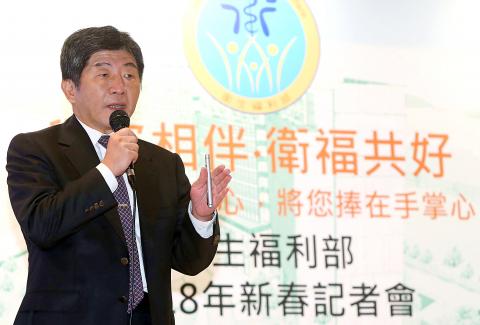The government might review its ban on food imports from five Japanese prefectures in line with global practice, Minister of Health and Welfare Chen Shih-chung (陳時中) said yesterday.
“It is time to reassess Taiwan’s policy on Japanese food imports. The government might follow the US and adopt risk-based restrictions, instead of the current regionally based ban,” Chen said.
Food imports from Fukushima, Ibaraki, Tochigi, Gunma and Chiba prefectures have been suspended since shortly after the Fukushima Dai-ichi nuclear power plant disaster in March 2011.

Photo: CNA
The government would not allow the entry of radiation-tainted food, but should ease the rules on non-contaminated products, which would be in line with international trade practices, Chen said.
The government must differentiate between “Japanese foods” and “radiation-tainted foods,” he said.
If food products from the prefectures are allowed to be imported, the ministry would do everything it can to ensure their safety, “but there is no timetable for that to happen,” Chen said.
“Taiwan cannot distance itself from the issue,” Deputy Minister of Health and Welfare Ho Chi-kung (何啟功) said. “It is not good to maintain the ban for so many years” when nations worldwide are gradually relaxing their restrictions.
“Some banned food products from the five prefectures are safe,” he said, adding that food at Chiba’s Narita International Airport might contain ingredients from the prefecture.
Chen and Ho’s remarks came just days after Taiwan-Japan Relations Association Deputy Secretary-General Fan Chen-kuo (范振國) said that continuation of the ban might jeopardize the nation’s bid to join the Comprehensive and Progressive Agreement for the Trans-Pacific Partnership.

NATIONAL SECURITY THREAT: An official said that Guan Guan’s comments had gone beyond the threshold of free speech, as she advocated for the destruction of the ROC China-born media influencer Guan Guan’s (關關) residency permit has been revoked for repeatedly posting pro-China content that threatens national security, the National Immigration Agency said yesterday. Guan Guan has said many controversial things in her videos posted to Douyin (抖音), including “the red flag will soon be painted all over Taiwan” and “Taiwan is an inseparable part of China,” while expressing hope for expedited “reunification.” The agency received multiple reports alleging that Guan Guan had advocated for armed reunification last year. After investigating, the agency last month issued a notice requiring her to appear and account for her actions. Guan Guan appeared as required,

A Vietnamese migrant worker yesterday won NT$12 million (US$379,627) on a Lunar New Year scratch card in Kaohsiung as part of Taiwan Lottery Co’s (台灣彩券) “NT$12 Million Grand Fortune” (1200萬大吉利) game. The man was the first top-prize winner of the new game launched on Jan. 6 to mark the Lunar New Year. Three Vietnamese migrant workers visited a Taiwan Lottery shop on Xinyue Street in Kaohsiung’s Gangshan District (崗山), a store representative said. The player bought multiple tickets and, after winning nothing, held the final lottery ticket in one hand and rubbed the store’s statue of the Maitreya Buddha’s belly with the other,

DAREDEVIL: Honnold said it had always been a dream of his to climb Taipei 101, while a Netflix producer said the skyscraper was ‘a real icon of this country’ US climber Alex Honnold yesterday took on Taiwan’s tallest building, becoming the first person to scale Taipei 101 without a rope, harness or safety net. Hundreds of spectators gathered at the base of the 101-story skyscraper to watch Honnold, 40, embark on his daredevil feat, which was also broadcast live on Netflix. Dressed in a red T-shirt and yellow custom-made climbing shoes, Honnold swiftly moved up the southeast face of the glass and steel building. At one point, he stepped onto a platform midway up to wave down at fans and onlookers who were taking photos. People watching from inside

‘NATO-PLUS’: ‘Our strategic partners in the Indo-Pacific are facing increasing aggression by the Chinese Communist Party,’ US Representative Rob Wittman said The US House of Representatives on Monday released its version of the Consolidated Appropriations Act, which includes US$1.15 billion to support security cooperation with Taiwan. The omnibus act, covering US$1.2 trillion of spending, allocates US$1 billion for the Taiwan Security Cooperation Initiative, as well as US$150 million for the replacement of defense articles and reimbursement of defense services provided to Taiwan. The fund allocations were based on the US National Defense Authorization Act for fiscal 2026 that was passed by the US Congress last month and authorized up to US$1 billion to the US Defense Security Cooperation Agency in support of the